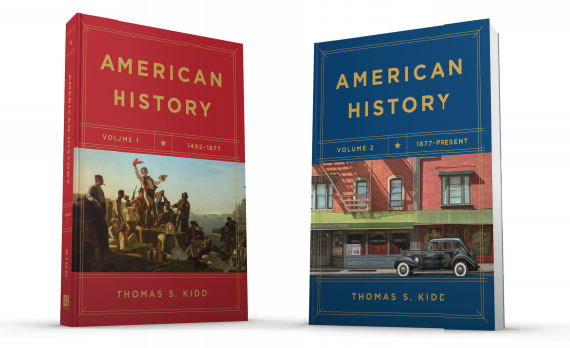Thomas Kidd’s American History textbook is now available.
- Volume 1 covers 1492 to 1877, from early American encounters to Reconstruction.
- Volume 2 goes from 1877 to the present, covering the post-Reconstruction era up to the age of terrorism.
Totaling nearly 700 pages—and endorsed by George Marsden, Mark Noll, and other scholars—these full-color paperbacks with Kidd’s trademark clarity are accessible resources that I expect will be widely appreciated in the classroom and beyond.
I have reprinted below his introduction to the textbook, which him allows him to talk about some of the unique features of his work.
Writing an overview of American history—or of any nation’s history—is a daunting task. There’s so much to cover, yet so much has to be left out.
Great Events and Everyday People
Most people who have ever lived left us little to no surviving records of their lives. Historical overviews usually focus on luminaries such as presidents, tycoons, inventors, and celebrities. And they focus on great events such as battles, economic disasters, and presidential elections.
My overview of American history focuses a great deal on such characters and events too. But I have tried where possible to weave in anecdotes of regular people as well. Often my justification for weaving in such stories is their utter typicality, or the way they illuminate people’s everyday experiences and struggles.
Focusing on great events also risks giving the impression that those events had the same significance for everyone in America, but that has rarely been the case. Take the Revolutionary War journal of Baptist chaplain Hezekiah Smith, for example. The July 1776 weekend that the Declaration of Independence was signed, Smith wrote one line in his journal: “Something unwell, tho’ kept about.” He was sick and did not know about events transpiring in Philadelphia that weekend. What seems inordinately significant in retrospect may not have seemed so important at the time. Conversely, events and people that seem momentous at the time may not appear that way in retrospect.
To narrow the focus of this book and make it manageable, I have emphasized certain major themes in American history. Some of the focus emerges from my own interests and perspective.
1. Religion
Readers should know that I am a Christian, and a Baptist in particular. I identify with the historic evangelical tradition and the faith of figures such as the Baptist champions of revival and religious liberty in the eighteenth century. This commitment profoundly shapes my view of history. Therefore, I give a lot of attention to religion. I admittedly think that religious people (which in America has mostly meant Christians), for all their faults, have generally been a force for good in American history. I also illustrate that America’s best ideas and most stirring speeches have often been rooted in the language and concepts of faith.
2. Racial and Ethnic Conflict
Another major theme of this book is racial and ethnic conflict. From the coming of the first colonizers, and the first shipments of slaves, racial tension and violence have been enduring themes in American history. They remain so today. There are obvious signs of progress in race relations in American history such as the end of slavery and the civil rights movement. But just when we think we’ve entered a “post-racial” America, racial controversies and racial violence roil American society again. These themes, both valuable and painful to consider, are ones to which Christian historians should give special attention.
3. Culture
A final major theme is the state of American culture, especially with regard to issues such as virtue, traditional moral norms, mass media, and entertainment. These issues are in the background of the whole book. Beginning in the late nineteenth century, however, entertainment and mass media have become progressively central to everyday American life. In an indirectly related development, our most basic cultural institutions, such as family and marriage, have come under increasing duress. Especially since the 1960s, Americans have been jettisoning some of our most basic assumptions about a good society and a wholesome life. We have simultaneously been “amusing ourselves to death,” in the words of scholar Neil Postman, as mass media, sports, entertainment, and marketing have become increasingly paramount in our daily lives. I tend to observe and describe rather than excoriate and prescribe in this book. But the accelerating pace of social change, and Americans’ concomitant obsession with entertainment, will be obvious.
National Autobiography
A book on American history is something like national autobiography.
It tells us how we got where we are.
It cautions us about mistakes and sins we have committed in the past and urges us not to go there again.
It encourages us to understand why the past is often pertinent to the present.
It inspires us by the courage of historical heroes and stiffens our resolve as we try to honor their legacies.
Christians believe the kingdom of God is our ultimate commitment, and we should confuse no temporal nation with that kingdom. But we are also thankful for the ways God has moved in American history, redeeming untold millions of people and building his church in each generation. I hope that readers will grow in their appreciation for the role faith played in the American past and discern the ways in which America has been (or has not been) a congenial place for people of faith to flourish.
For more information, including endorsements and how to request a review copy for your classroom, visit the textbook’s homepage.
